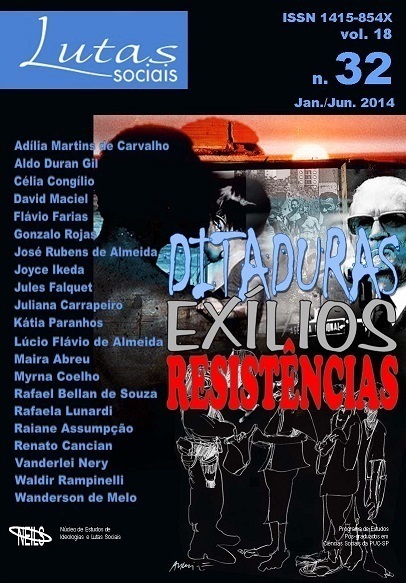The military dictatorship in Argentina (1967-1983): revisiting some hypotheses in the face of official narratives
DOI:
https://doi.org/10.23925/ls.v18i32.25699Keywords:
Argentina, military dictatorship, political regime, the State, class struggle, working class.Abstract
The goal of this article is to undertake an analysis of the Argentine military dictatorship (1976-1983) working briefly, based on bibliographical sources, with five non-hegemonic hypotheseson the topic in the official state narratives: 1) Neoliberalism in Argentina begins in 1975 duringthe government of Isabel Perón and it was consolidated during the military dictatorship; 2) The military dictatorship ended the hegemonic crisis of the dominant class bloc in favor offinancial capital and defeated the ascendance of the masses of the Argentine working classthat began with the “Cordobazo”; 3) The victims were not the entire society; 4) The MalvinasWar was an attempt by the Armed Forces to gain autonomy from the dominant class bloc thathad supported them and the Armed Forces paid for that attempt with the trials of the militaryjunta; 5) During the Alfonsín and Kirchner governments, the human rights movement splitsbetween those who maintain the movement’s positions and those who find state politics to bethe only option.Metrics
Metrics Loading ...
Downloads
Published
2014-07-01
How to Cite
Rojas, G. A. (2014). The military dictatorship in Argentina (1967-1983): revisiting some hypotheses in the face of official narratives. Lutas Sociais, 18(32), 163–176. https://doi.org/10.23925/ls.v18i32.25699
Issue
Section
Dossier
License
Matérias assinadas não expressam necessariamente a posição do coletivo da revista e são de exclusiva responsabilidade do(a)s respectivo(a)s autore(a)s.
Ao enviar seus textos, o(a)s autore(a)s cedem seus direitos à Lutas Sociais, que autoriza, com prévia permissão do Comitê Editorial, a reprodução das publicações, desde que conste o crédito de referência.



